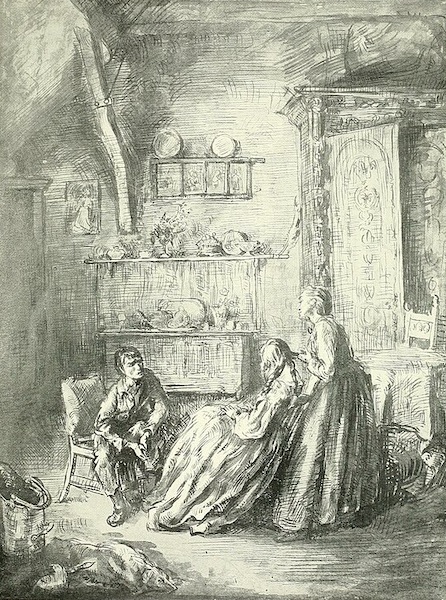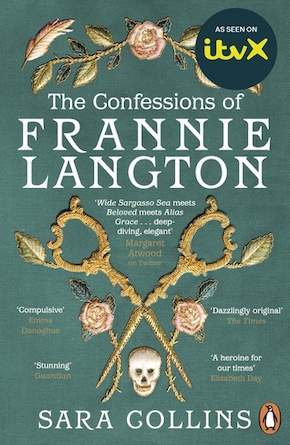Those who serve
by Rosie Andrews
In a world where you could be anything, who would be a fictional servant? They fetch and carry, are paid a pittance, and they only get a half day off. It would be understandable if fictional servants just drifted in and out of rooms proffering food and drink, with hardly a thought or feeling between them. They don’t, however. All-seeing, all-hearing, servants loom large in literature, meddling, gossiping, keeping secrets or telling them. Very often they reveal the heart of the story.
Which characters might be in my top ten? My list is drawn more broadly than maids and butlers; we also have governesses, batmen and even a former Chancellor of the Exchequer. Therefore a definition might help: a servant is someone who, at least ostensibly, carries out the will of another, sacrificing their personal agency.
It would be boring reading if servants only ever did that, and of course they don’t. In my second novel The Puzzle Wood, a young woman arrives at an isolated house in the Welsh Marches. She has been hired as a governess, but has a more urgent mission: to discover the true fate of her sister, who is said to have died there. Assumed to have almost no will of her own, Catherine is expected to occupy the space of Locksley Abbey without changing it. It probably goes without saying that this doesn’t happen.
My first choice below was an inspiration for The Puzzle Wood, and also involves a governess who arrives at an isolated house, as strange events take place…
Jane Eyre (Jane Eyre, Charlotte Brontë)
Hired to keep a lively little girl from under the feet of her father figure, Jane possesses an individuality that bewilders and enchants her master. Whatever he expects of women of her class, her individualism – particularly her imagination and moral fibre – can’t be hidden. Jane is not a cipher; there she stands, so collectedly, Brontë’s rebuke to the hierarchical assumptions of the Victorian upper classes.
Stevens (The Remains of the Day, Kazuo Ishiguro)
A devoted servant, Stevens insists he is nothing more than a vessel into which the desires of his master might be poured, but he turns out, involuntarily, to have an identity of his own that can’t, or can’t entirely be suppressed. In the end (spoiler!) this nascent personal agency – in the form of romantic desire – is sacrificed to his conception of duty.
Mrs Danvers (Rebecca, Daphne du Maurier)
Mrs Danvers was a happy inferior, existing in slavish devotion to her mistress’s needs. The implacable hatred she shows the second Mrs de Winter is caused by the servant’s sense that her new mistress is unworthy. This turns Mrs Danvers into an antagonist, and a terrifying one too, with complex motivations of both love and hate.
Frannie Langton (The Confessions of Frannie Langton, Sara Collins)
Clever, but condemned for murder, Frannie narrates dark, complicated deeds. She can be read as a protagonist more in the mould of the noble but flawed gothic lead character, refusing the role of ‘just’ a servant, insisting on her voice (and what a glorious voice it is!).
Samwise Gamgee (The Lord of the Rings, J.R.R. Tolkien)
Samwise is Frodo’s gardener, but his desire to accompany Frodo on his quest comes as much from a sense of adventure as from duty. As the story progresses, Sam shows the quiet heroism, stoicism and loyalty for which Tolkien, who fought at the Somme, admired the soldiers he met. While we as modern readers might ask more probing questions about class, we are still moved by Sam’s qualities, and he represents the beating heart of the story.
The governess (The Turn of the Screw, Henry James)
The nameless governess appears, at least initially, as the heroine, determined to make herself indispensable to the attractive owner of Bly Manor, who has hired her to care for two children. We come to realise that this self-perception is unreliable, and the young woman’s desire to see herself in that way might be the cause of more harm than assistance to her young charges.
Becky Sharp (Vanity Fair, William Thackeray)
The position of servant is often Janus-like, illuminating scenes in more than one direction as the reader’s gaze is turned down on the kitchen, then up to the drawing room. In this way, Becky Sharp takes us through the levels of Victorian society over the years, scheming and betraying. Thackeray maintains ambiguity by presenting her as a character who achieves social progression, and whom we are meant to like, but who ends her days in penury, maintaining at least the appearance of a moral lesson.

Thomas Cromwell (Wolf Hall, Hilary Mantel)
Upward social mobility is a common feature of stories involving servants, but my next choice, Thomas Cromwell from Mantel’s Wolf Hall trilogy, is less typical. The saga is based on Cromwell’s real-life career – he was the son of a Putney tradesman – and more importantly, it is only at its peak that this career makes the protagonist a servant: Cromwell is employed as the hand of Henry VIII, and although otherwise he is the most powerful figure in the country, it is his inability to carry out his master’s will that brings his downfall.
Nelly Dean (Wuthering Heights, Emily Brontë)
Servants see and hear things, and are often around for a long time, so if we want to find out ‘what’s been going on’, and if the servant can be persuaded to speak, we might receive a tale or two beside the fire. In Wuthering Heights Nelly Dean is this repository for secrets. Her voice gives us the main narrative framing of the story – we see the characters through her eyes, and, as someone who can choose either to tell Lockwood the disturbing history of Wuthering Heights or to remain silent, she wields a sturdy and surprising influence.
Arthur Hastings (Poirot stories, Agatha Christie)
A character who wields almost no influence, and who is not truly a servant but is perhaps the best example of one, who subordinates his will almost entirely, is Arthur Hastings, Hercule Poirot’s loyal hound. Hastings, unlike many of these characters, is his master’s equal, at least on the surface. He is an upper-class male, not reliant on an income (or receiving one) for his service. He has all the agency he could ask for, but doesn’t ask. He remains devoted to his friend, serving him to his very last case. It might be a closing irony that my final choice (and one of my favourites) is a character who has no need to meet my definition of a servant, but does so anyway, out of love.
—

Rosie Andrews was born and grew up in Liverpool and studied History at Cambridge before becoming an English teacher. She lives in Hertfordshire with her husband and daughter. Her debut novel, The Leviathan, a Sunday Times bestseller, was shortlisted for the Goldsboro Books Glass Bell Award, the HWA Debut Crown Award and the Books Are My Bag Readers Award for Fiction. The Puzzle Wood is published by Raven Books in hardback, eBook and audio download.
Read more
@rosieandrews22
@BloomsburyRaven
Author photo by Sally Masson


